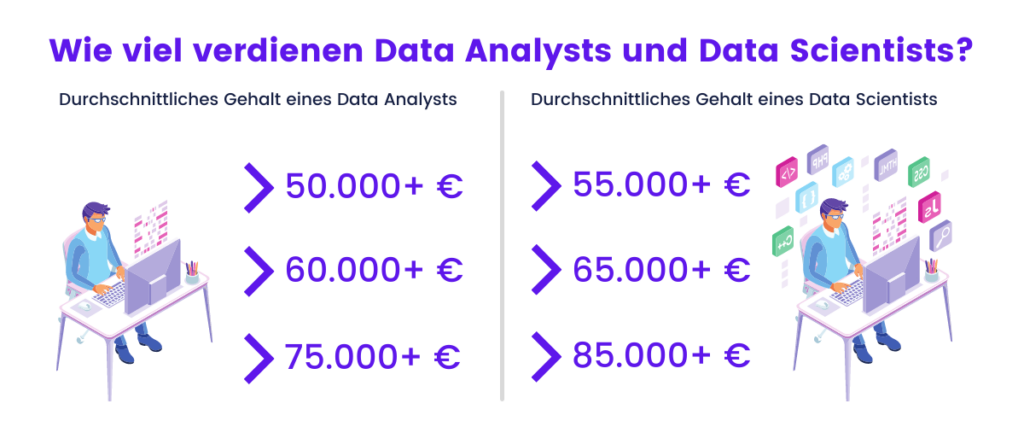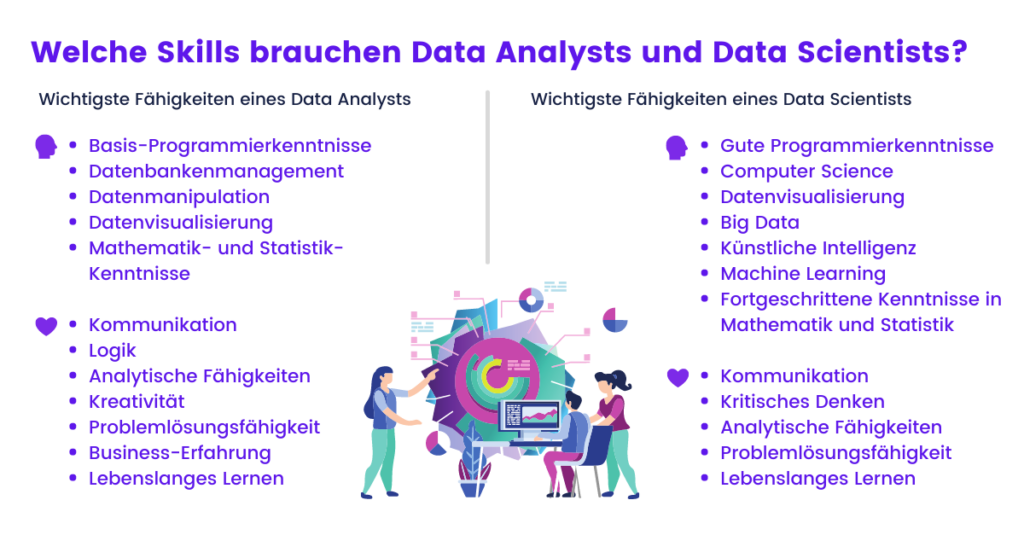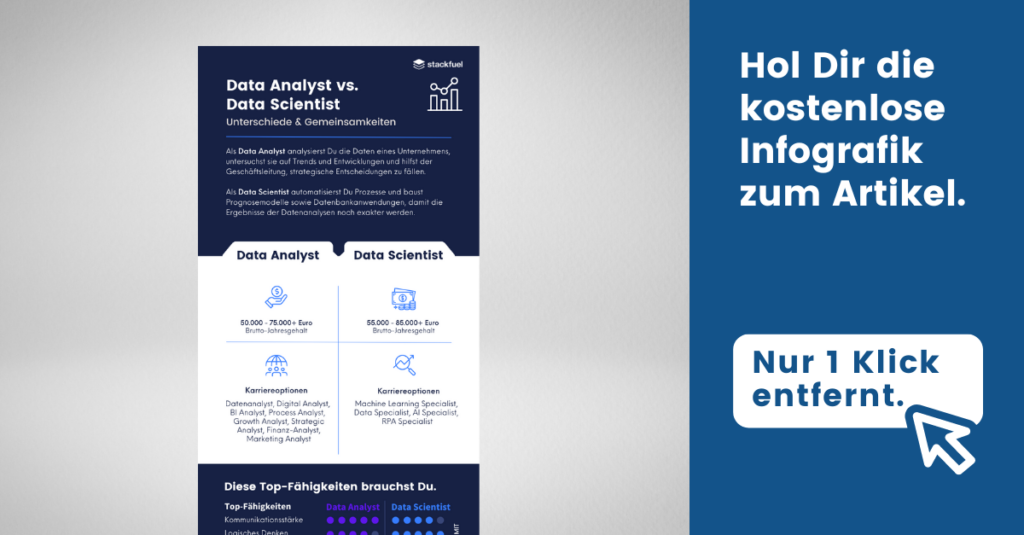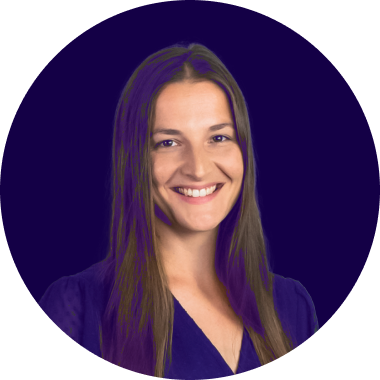In this series of articles "Data Scientist vs. Data Analyst", we compare both job descriptions and clarify whether you are better suited as a Data Analyst or Data Scientist. We will take a look at the differences and similarities, career paths, tasks, essential skills and the salary as a Data Analyst and Data Scientist.
By the way: If you are interested in further training to become a data scientist or data analyst, you can do this thanks to Education voucher even free of charge under certain conditions.
Data Analyst salary vs Data Scientist salary
Even if the salary is not the deciding factor for a further education or a career change, you would still like to know what earnings opportunities Data Scientist and Data Analyst have to offer.

Depending on your experience level and the skills you bring to your job as a Data Analyst or Data Scientist, your salary will also increase.
How much does a Data Analyst earn? The average Data Analyst salary varies depending on location and experience, but often offers attractive remuneration and development opportunities in the technology industry. Junior data analysts can expect a gross annual salary of around 50,000 euros. With more experience as a Data Analyst, your salary will increase accordingly to around 60,000 euros and very experienced Data Analysts earn up to 75,000 euros per year.
How much does a Data Scientist earn? A Data Scientist salary is somewhat higher than a Data Analyst salary, because they must have more skills, especially in the area of programming. The following salary information is to be understood as an average and can increase significantly if you have additional special knowledge as a data scientist and continue to train on the job.
Data Scientist beginners earn around 55,000 euros per year. Data Scientists with more job experience earn around 65,000 euros, and those who have been with the company for longer and have the right skills earn up to 85,000 euros per year.
If you've read this far, you probably already know that the higher salary of Data Scientists is due to the fact that they need to have more specialized skills for their job. That's why we'll look at the requirements and skills for both data jobs in the following section.

Requirements for Data Scientists and Data Analysts
Let's first look at the academic requirements for the job of Data Analyst or Data Scientist. Even though the jobs of Data Analysts and Data Scientists are both very demanding, they can still be learned and, like any other tech job, come with clear prerequisites. Let's take a closer look at these.
For both career paths, at least a bachelor's degree with a scientific focus such as mathematics, computer science or statistics is considered a good prerequisite. Especially as a prerequisite for Data Scientists, the higher the degree in a scientific field or even a doctorate, the easier it is to get a job as a Data Scientist. However, this is not a fixed prerequisite.
For data analysts, a bachelor's degree in a non-technical subject such as business administration and professional experience in the field in which you would like to work as a data analyst are usually sufficient. A good knowledge of the industry is the key here.

By now you know that Data Scientists and Data Analysts both work with data, but each in a different way. This also requires a different set of skills and tools. These skills are required for both professions:
Mathematics and statistics
Clearly, whether you're a data analyst or data scientist, you need math and statistics to do your job. If you are thinking back to difficult math exams from high school, don't worry, a data job is not a math exam.
In fact, as a data analyst or data scientist, you will focus on programs that do the math for you. However, you need to know which diagram best describes your data and you should be able to check whether your analyses are coherent and correct.
As a Data Scientist, you need to be able to write machine learning algorithms, which requires a very advanced understanding of mathematics and statistics. For this there are specialized bootcamps, where you learn these skills not just theoretically, but through learning-by-doing, which is especially beneficial to those who wouldn't call themselves math aces.
Programming
Both data analysts and data scientists need to know how to program. The most important skill is certainly Python, a particularly versatile programming language that is important for automating processes, for example. If you want to know why learning Python is not only worthwhile, but also fun, we can help you with this article recommend
Other important programming skills you'll need as a Data Scientist or Data Analyst are SQL, OOP (Object-Oriented Programming), or R.
Software expertise
These differ not only for Data Analyst or Data Scientist, but also depending on the company and the area of responsibility. Nevertheless, we have listed the most important software types here:
- Excel
- MySQL
- TensorFlow
- Spark
- Business Intelligence Software
- SAS
- Hadoop
Soft Skills
Data Analysts and Data Scientists are characterized not only by technical skills, but also by certain soft skills. Most important is a logical, analytical way of thinking. If you enjoy finding answers to questions and questioning the questions yourself, then you're in the right place.
Communication skills are also indispensable. As a Data Scientist or Data Analyst, you are in constant contact with decision-makers from specialist departments and the management level. It is not only important to network well, but you must be able to adapt to every level of knowledge in order to present the results of your analyses in such a way that everyone understands them.
You should not immediately shy away from new, complex projects and issues, but approach them with curiosity. For this, it is important that you are always willing to continue your education, learn new things and enjoy acquiring knowledge.

Job entry as Data Analyst or Data Scientist without previous knowledge
Data Scientist Online Masters, Data Science Bootcamps, and other educational pathways. The options are numerous, but not equally suitable for everyone.
But let's start with the good news: Yes, you can learn both professions in just a few months and make the lateral move. You can learn a lot yourself and rely on reference books and online tutorials. But what you really need if you want to make it through the application process as a Data Analyst or Data Scientist is a certificate and practical knowledge relevant to the company.
There is a reason why there are numerous data science bootcamps, online learning platforms and data science learning providers. Here you should definitely pay attention to several quality criteria. But first you need to clarify the following questions for yourself in order to find the right one for you from the large selection:
- Do you have previous experience with programming, mathematics or statistics?
- Are you well organized and can easily motivate yourself to study every day for a long time?
- Do you find it easy to understand and implement technical concepts without outside, individual or even personal guidance?
If your answers to all these questions are yes, then you can try Data Science online tutorials and free Data Science bootcamps, which require some prior knowledge, a lot of self-discipline, and a quick grasp.
If you couldn't answer each of these questions with a confident yes, you're better off basing your potential career change as a Data Analyst or Data Scientist on a solid foundation of knowledge and certification. Why? While it's appealing to take advantage of the free Data Science learning opportunities, this field is too complex to develop at a level that leads to employment without guidance and consistent mentoring from experienced Data Scientists.
Even with reputable data science bootcamps, there are big differences that should play a role in your choice. It should be said that many and especially free data science bootcamps do not necessarily offer the quality and depth of information that is especially important for beginners. It is therefore worthwhile to invest in a solid and recognized basic training that enables you to expand your knowledge autodidactically if necessary.
With a good knowledge base, which StackFuel and other certified data science bootcamps teach you and also certify, you can even start directly as a (junior) data analyst or data scientist at companies and take your first career steps. That's why it's so important to choose a bootcamp that works with realistic data sets and use cases from the business world and reliably teaches you the skills you need as a career changer.
The community and mentoring of data science bootcamps are also important, as they can help you make important contacts early on that will later lead to your entry-level job as a data scientist or data analyst through referrals.
Let's recap the key quality criteria for bootcamps and other learning opportunities:
- Real business cases and practical tasks that prepare you for everyday work
- The right mix of theoretical instruction, interactive learning-by-doing, face-to-face webinars, and sharing with the learning community.
- End-to-end mentoring from experienced Data Scientists, including onboarding and offboarding, project mentoring, weekly webinars, and support
- A recognized certificate of completion - the golden ticket to your first job as a Data Scientist or Data Analyst
- Multiple language options
- As a jobseeker, but also as an employee, you may be entitled to a 100%ige cost absorption with an education voucher have. Pay attention to the AZAV certification of the learning provider!
- And last but not least, that the provider itself is certified and thus also recognized. (For example, StackFuel is a TÜV and AZAV certified programming and data science learning provider).
Summary at a glance
We have collected the most important points of the comparison "Data Analyst or Data Scientist" for you in a free infographic.

StackFuels Bootcamp 2023: Become a Data Analyst or Data Scientist in just a few months
If you are still looking for a bootcamp with Data Science online course including certificate, then we have just the thing for you: In StackFuel's English- and German-language Data Science Bootcamp with certificate and Data Analyst Bootcamp with Certificate you will learn the basics and advanced skills you need for your day-to-day job as a Data Analyst or Data Scientist and gain experience in:
Data Analyst with focus on Python
- Implement complex data analysis in the subject domain
- merge data sources (databases, APIs, web crawling)
- The understanding of the work steps within a complex analysis
- Best practices in the implementation of data analysis
- Increase competitiveness with data-driven decisions
Data Scientist with focus on Python
- Enable data-based (automated) decision making
- Implement relevant data science projects with the help of knowledge from the subject domain
- Make data-based predictions in the field
- Apply performance metrics and models of supervised and unsupervised learning with sklearn
- Know the basics of data storytelling
- Best practices of interpreting supervised and unsupervised learning algorithms such as decision trees and random forests.
Particularly for career changers our recognized Certificate of completionwhich you receive upon successful completion of our bootcamps, is so valuable because it certifies and thus validates your new Data Science skills.
We put the focus on Realistic practical projects and a good Mentoring by professionally experienced Data Scientists. In the Live webinars you can ask your questions and benefit from the StackFuel Community.
Find out about start dates, duration, prices and requirements on our bootcamp pages here.

Sources
World Economic Forum (2020): The Future of Jobs Report 2022 [05.04.2022]
Stack Exchange (2021): Data science without knowledge of a specific topic, is it worth pursuing as a career? [07.04.2022]
Glassdoor (2022): Salary for Data Analyst, Munich, Germany [01.04.2022]
Glassdoor (2022): Salary for Data Scientist, Munich, Germany [01.04.2022]





